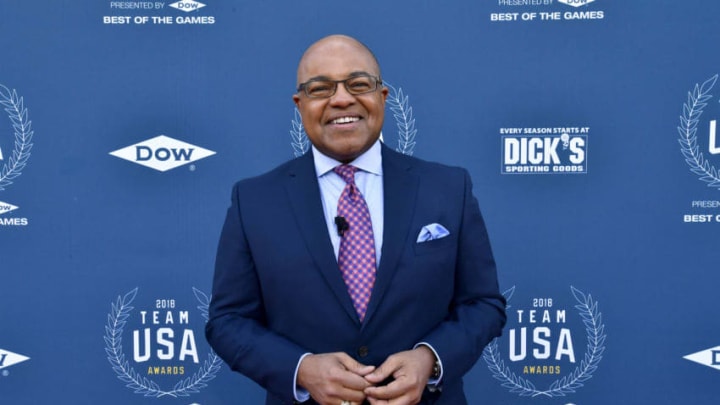Syracuse Orange alums Mike Tirico and Ian Eagle recently discussed what sports will look like in the future.
The novel coronavirus pandemic has drastically altered the worldwide sports landscape, affecting professional leagues around the globe, along with college sports teams, including our beloved Syracuse Orange.
There are encouraging signs that some sports will resume in the near future, for instance, the NBA, whose board of governors has approved a plan to restart their 2019-20 term. ‘Cuse football players, and others competing in Syracuse fall sports, may return to the Hill this Monday for voluntary training.
Yet even amid perhaps a sense of greater optimism that the Orange will, in fact, play a 2020 campaign, the pandemic has brought with it a stunning – but not completely surprising – absoluteness that the NCAA and its member institutions, including Syracuse University, are dealing with a ton of complex issues related to college sports.
Mike Tirico, the acclaimed NBC Sports broadcaster, proud SU alum and member of the university’s board of trustees, says that “this is a major change moment for intercollegiate athletics” and noted that college sports have “gotten out of whack some.”
Tirico’s comments came during a recent virtual discussion that he participated in with another famous Syracuse alum, Ian Eagle, who is a play-by-play announcer with CBS Sports, YES Network, TNT and Westwood One Radio.
The university’s S.I. Newhouse School of Public Communications, which I graduated from in 2000, held the call with Tirico and Eagle, and I was invited to participate. I felt privileged to hear these two renowned broadcasters, who both bleed Orange, provide some thoughts on how the pandemic will affect the future of sports.
Tirico says that he’s more optimistic than several weeks ago that college football will commence come this fall, but the season should only occur if students are back on campus.
If U.S. colleges and universities ultimately ended up going virtual with their learning environments, then college football at Syracuse and around the country should not get played, Tirico says. The NCAA’s president, Mark Emmert, has echoed those sentiments.
Tirico noted controversial topics like the ongoing name, image and likeness debate for student-athletes. Virtually all student-athletes receive scholarships, which are quite valuable, but often that is overlooked. Coaches’ salaries can prove massive.
The college-sports community and its various stakeholders “need to figure out how to rebalance all of this,” Tirico says, adding that intercollegiate athletics have “gotten so far away from the mission” of the actual colleges and universities.
The 2020 March Madness getting canceled dealt a huge financial blow, and if college football doesn’t happen, it will have a serious impact on Olympic sports. Already, some colleges and universities are unfortunately eliminating these so-called non-revenue sports.
The “economics are real,” Tirico says, and funding Olympic sports is a challenge. Heck, given everything that is going on stemming from the pandemic, there is speculation that the Power Five leagues, including the Atlantic Coast Conference where Syracuse University is a participant, could eventually break away from the NCAA.
Syracuse Orange alums Mike Tirico, Ian Eagle sound off on sports during the pandemic.
Even as college and pro sports plan for their returns, presumably without fans in the stands, Tirico and Eagle wonder what will transpire if there is a COVID-19 outbreak resulting from athletic competitions resuming.
In the NBA, for instance, and also for college basketball down the road, the players are in such close contact, says Eagle, adding, “How do you stay safe?”
Athletes, while gifted in their craft, still have the same concerns and fears that we all have, Eagle says. “There is no playbook here,” he says, and “this is not a simple fix by any stretch.”
For the NBA and other sports leagues, there need to be provisions in place so that, if a player tests positive for COVID-19, he or she is removed from the competition, “but everything can’t fall apart,” Eagle says.
The sportscasters say that television ratings could prove strong out of the gate, because people are craving for live sports. But if there aren’t fans in attendance, that is substantial money lost on ticket sales, food and merchandise, among other items.
Interest may be higher, Tirico says, but what about revenue generation?
I’m fascinated to see how all of this shakes out. Naturally, I’m hopeful that Syracuse football and other fall sports move ahead. But everyone has to stay safe in doing so.
As far as Orange basketball is concerned, and whether it will get played in 2020-21, I posed that question to Tirico and Eagle as part of the discussion’s Q&A. But time ran out before they could answer.
My fingers are crossed that the ‘Cuse can take the court in a few months.
